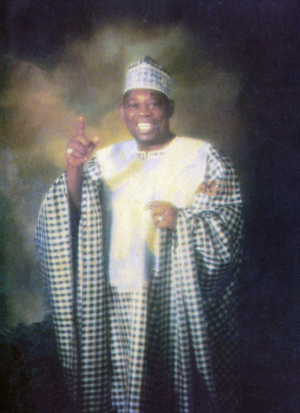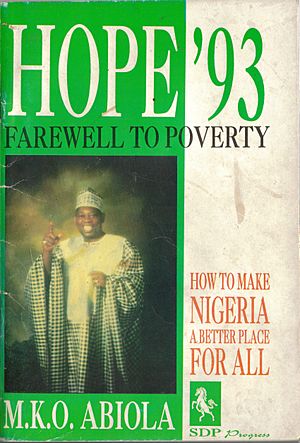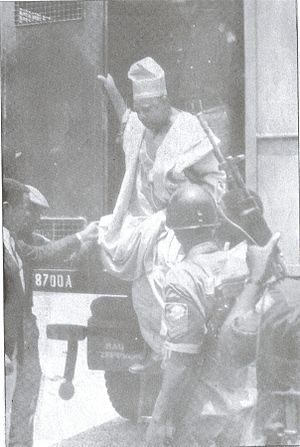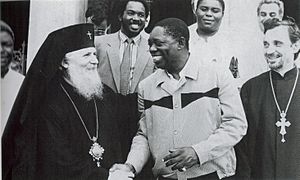Moshood Abiola facts for kids
Quick facts for kids
Moshood Abiola
|
|
|---|---|

M.K.O. Abiola in 1993
|
|
| Personal details | |
| Born | 24 August 1937 Abeokuta, Southern Region, British Nigeria (now in Ogun State, Nigeria) |
| Died | 7 July 1998 (aged 60) Abuja, Nigeria |
| Spouses |
Simbiat Shoaga
(m. 1960; died 1992)Kudirat Adeyemi
(m. 1973; died 1996)Adebisi Oshin
(m. 1974)Doyinsola Aboaba
(m. 1981)
|
| Children | 40 (reportedly) |
| Occupation |
|
Moshood Kashimawo Olawale Abiola, also known as M. K. O. Abiola (born August 24, 1937 – died July 7, 1998), was a famous Nigerian businessman, publisher, and politician. He held the important title of Aare Ona Kankafo XIV of Yorubaland and was a respected leader of the Egba clan.
M.K.O. Abiola ran for president in the 1993 Nigerian presidential election. Many believed he won, but the election results were cancelled by the military president at the time, Ibrahim Babangida. Years later, on June 6, 2018, President Muhammadu Buhari honored Abiola with Nigeria's highest award, the Grand Commander of the Order of the Federal Republic (GCFR). This award is usually given only to Nigerian heads of state. Nigeria's Democracy Day was also changed to June 12 to remember him.
Abiola was a friend of Ibrahim Babangida and was thought to have supported Babangida's rise to power.
In the June 1993 presidential election, Abiola had support from all parts of Nigeria and from people of different religions. This was rare for a politician back then. By the time he passed away, he had become a powerful symbol of democracy for many.
Contents
Early Life and Education
M. K. O. Abiola was born in Abeokuta, Ogun State, to Salawu and Suliat Wuraola Abiola. His father was a trader who sold cocoa, and his mother sold kola nuts. His name, Kashimawo, means "Let us wait and see." Moshood was his father's twenty-third child, but he was the first to survive past infancy. Because of this, he was given the name 'Kashimawo'. He was properly named Moshood by his parents when he was fifteen.
Abiola went to African Central School in Abeokuta for his primary education. As a young boy, he helped his father with the cocoa trade. However, by the end of 1946, his father's business faced problems.
At nine years old, Abiola started his first business. He sold firewood that he gathered in the forest before school. This helped him support his father and siblings. At fifteen, Abiola started a music band. They performed at events for food. Later, he was able to charge money for his performances. He used this money to help his family and pay for his secondary education at the Baptist Boys High School in Abeokuta. Abiola was the editor of the school magazine, The Trumpeter, and Olusegun Obasanjo was the deputy editor. When he was 19, he joined the National Council of Nigeria and the Cameroons political party.
In 1960, he received a government scholarship to study at the University of Glasgow in Scotland. He earned a degree in accountancy and became a chartered accountant. He later became a Fellow of the Institute of Chartered Accountants of Nigeria (ICAN).
Business Career
Moshood Abiola began his professional life in 1956 as a bank clerk at Barclays Bank in Ibadan, South-West Nigeria. After two years, he worked as an executive accounts officer for the Western Region Finance Corporation. Then, he went to Glasgow, Scotland, for his higher education. He earned a top degree in accountancy from Glasgow University.
When he returned to Nigeria, Abiola worked as a senior accountant at the University of Lagos Teaching Hospital. He then joined the US company Pfizer. Later, he moved to ITT Corporation, where he became vice-president for Africa and the Middle East. Abiola spent a lot of time and earned most of his money in the United States. He also remained the chairman of ITT's Nigerian branch.
ITT and Other Businesses
While working at Pfizer's Nigerian branch, Abiola wanted to own a part of the company, but the options were not good. He then applied for a job as a trained accountant and found out it was for ITT Corporation. Abiola was hired, and one of his first jobs was to collect old debts owed to the company by the military.
Abiola was determined to collect these debts. He used this determination to get a bigger role in the company. He eventually got 49% ownership of ITT's Nigerian branch. He also started his own side business called Radio Communication (RCN). RCN trained new employees to sell telecom equipment. Abiola focused on the military as clients, as they were replacing their old equipment from the civil war. His plan was to train military staff to use the equipment themselves. This way, they would not need outside help for maintenance. This idea was popular with the armed forces.
RCN went on to build a communication network for the armed forces. In 1975, ITT and its partners won a big contract to provide automatic telephone exchanges across Nigeria.
Other Ventures
Besides his work in the Middle East and Africa, Abiola invested a lot in Nigeria and West Africa. He started many businesses, including Abiola Farms, Abiola Bookshops, Radio Communications Nigeria, Wonder Bakeries, Concord Press, Concord Airlines, Summit Oil International Ltd, Africa Ocean Lines, Habib Bank, Decca W.A. Ltd, and Abiola football club.
He was also the Chairman of the G15 business council and President of the Nigerian Stock Exchange. He supported many foundations, including the Kwame Nkrumah Foundation and the WEB Du Bois foundation. In 1983, he helped start Africa Ocean Lines, a shipping company.
Involvement in Politics
Abiola's journey in politics began early. He joined the National Council of Nigeria and the Cameroons (NCNC) when he was 19. In 1979, the military government kept its promise and handed power back to civilian leaders. Abiola joined the ruling National Party of Nigeria (NPN) in 1980 and became the state chairman of his party.
After the 1983 re-election, things looked good for Abiola. The re-elected president was from his party, and it seemed he would be able to run for president himself after that term. However, his hopes were quickly ended in 1983 when a military takeover removed the re-elected president and ended civilian rule.
Abiola was a member of the Ansar Ud Deen organization in Nigeria. In the 1980s, through his National Concord Newspaper, Abiola supported Islamic causes. These included introducing a Sharia Court of Appeal in Southwestern Nigeria and Nigeria joining the Organization of Islamic Countries. His support for Islam in Southern Nigeria earned him respect in the Northern part of the country. In his hometown of Abeokuta, Abiola built a Quran training center named after his mother, Zulihat Abiola.
After ten years of military rule, General Ibrahim Babangida faced pressure to bring back democratic rule. After an earlier primary election was cancelled, Abiola ran for president for the Social Democratic Party (SDP). He won the party's nomination for the June 12, 1993, presidential elections. Abiola had worked hard to overcome poverty. He started Abiola bookshops to provide affordable textbooks in the 1980s when imported books became too expensive. He also made daily necessities like rice and soap available at fair prices.
Presidential Election
Primaries and Campaign
Abiola announced he would run for president in February 1993. This was after military President Babangida had cancelled an earlier round of presidential primaries. Abiola chose the SDP. He was new to the party's internal politics, which had two main groups. Both the SDP and the opposing party, NRC, held presidential primaries in March 1993.
The SDP's primaries were held in Jos. It was mainly a three-way race between Abiola, Kingibe, and Atiku. Abiola was strongly supported by one of the SDP groups. In the first vote, Abiola won by a small margin. A second round was held two days later, and Abiola won again, becoming the party's presidential candidate for the June 12 election.
Abiola's campaign promised a hopeful future for Nigeria. His slogans included "Farewell to poverty" and "At last! Our rays of Hope." His economic plans included working with foreign countries to manage Nigeria's international debts better. He presented himself as someone the international community could trust.
Election Day
For the June 12, 1993, presidential elections, Abiola's running mate was Baba Gana Kingibe, who had been his main opponent in the primaries. Abiola ran against Bashir Tofa of the National Republican Convention. Many observers, both Nigerian and international, said this election was the freest and fairest presidential election Nigeria had ever seen. Abiola even won in his Northern opponent's home state of Kano. He won in the capital city, Abuja, at military voting places, and in over two-thirds of Nigerian states.
For a long time, men from Northern Nigeria had mostly led the country's politics. Moshood Abiola, a Muslim from Western Nigeria, was able to win a national election fairly. This was a first in Nigeria's history. However, the election was cancelled by Ibrahim Babangida. This caused a political crisis, and General Sani Abacha took power later that year.
- Unofficial results
These are the unofficial results:
| State | SDP (Abiola) | NRC (Tofa) | State | SDP (Abiola) | NRC (Tofa) | State | SDP (Abiola) | NRC (Tofa) | ||
|---|---|---|---|---|---|---|---|---|---|---|
| Abia | 105,273 | 151,227 | Enugu | 263,101 | 284,050 | Niger | 136,350 | 221,437 | ||
| Adamawa | 140,875 | 167,239 | Imo | 159,350 | 195,836 | Ogun | 425,725 | 59,246 | ||
| Akwa Ibom | 214,787 | 199,342 | Jigawa | 138,552 | 89,836 | Ondo | 883,024 | 162,994 | ||
| Anambra | 212,024 | 159,258 | Kaduna | 389,713 | 356,860 | Osun | 365,266 | 72,068 | ||
| Bauchi | 339,339 | 524,836 | Kano | 169,619 | 154,809 | Oyo | 536,011 | 105,788 | ||
| Benue | 246,830 | 186,302 | Katsina | 171,162 | 271,077 | Plateau | 417,565 | 259,394 | ||
| Borno | 153,496 | 128,684 | Kebbi | 70,219 | 144,808 | Rivers | 370,578 | 640,973 | ||
| Cross River | 189,303 | 153,452 | Kogi | 222,760 | 265,732 | Sokoto | 97,726 | 372,250 | ||
| Delta | 327,277 | 145,001 | Kwara | 272,270 | 80,209 | Taraba | 101,887 | 64,001 | ||
| Edo | 205,407 | 103,572 | Lagos | 883,965 | 149,432 | Yobe | 111,887 | 64,061 | ||
| sub-total | 2,134,611 | 1,918,913 | 2,740,611 | 1,992,649 | Fct | 19,968 | 18,313 | |||
| 3,465,987 | 2,040,525 | |||||||||
| Cumulative | 8,341,309 | 5,952,087 | ||||||||
Imprisonment
In 1994, Moshood Abiola declared himself the rightful president of Nigeria in Lagos. He had just returned from a trip to gain international support for his election victory. After his declaration, he was accused of trying to take over the government illegally. He was arrested on the orders of military President General Sani Abacha.
M.K.O. Abiola was held for four years, mostly alone. He had a Bible, a Qur'an, and fourteen guards. During this time, important people like Pope John Paul II, Archbishop Desmond Tutu, and human rights activists from around the world asked the Nigerian government to release him. The only condition for his release was that he give up his claim to the presidency. He refused, even though the military government offered to pay him back for his election costs.
Death
Moshood Abiola died unexpectedly on July 7, 1998. This was shortly after General Abacha's death and on the very day Abiola was supposed to be released. He became ill and passed away while meeting with a group of American diplomats in Abuja.
An independent autopsy was done by doctors from Nigeria, Canada, the UK, and the US. They found strong evidence that Abiola had a long-standing heart disease. Regardless of the exact details, it was clear that Chief Abiola did not receive enough medical care for his existing health problems while in custody.
Investigations into Abiola's Death
There are different ideas about how Abiola died. The famous writer Wole Soyinka wrote in his book that Abiola was given poisoned tea during his last interview. He was sure Abiola was poisoned, but who was behind it is still not fully known.
Kofi Annan, who was the Secretary General of the United Nations, met with Abiola shortly before his death. Annan said that Abiola had not received proper medical care during his time in prison. This supported the findings of the international team of doctors who said a heart condition caused his death.
The Human Rights Violation Investigation Commission of Nigeria held hearings to find out the truth about Abiola's death. They concluded that the government at the time probably knew more than they shared.
Legacy
Chief M.K.O. Abiola is remembered and celebrated in Nigeria and around the world. Since his death, the Lagos State Government has made June 12 a public holiday. In 2018, other states like Ogun, Oyo, and Osun also made June 12 a holiday to mark the 25th anniversary of the cancelled 1993 presidential election. Starting June 12, 2019, June 12 became Nigeria's official Democracy Day, replacing May 29. Many events are held across Nigeria to remember him.
Places like MKO Abiola Stadium and Moshood Abiola Polytechnic were named in his honor. A statue, MKO Abiola Statue, was also built to remember him.
On May 29, 2012, former president Goodluck Jonathan announced that the famous University of Lagos would be renamed Moshood Abiola University of Lagos (MAULAG). However, students, alumni, and the public did not like this idea, so the name change was quickly reversed.
June 12 Declared Democracy Day
On June 6, 2018, Muhammadu Buhari, the President of Nigeria, announced that June 12 would be the new date for Democracy Day. Before this, Nigeria celebrated Democracy Day on May 29. That was the day in 1999 when the military government handed power to an elected president, Olusegun Obasanjo.
President Buhari explained that June 12, 1993, was more important for Nigerian democracy than May 29. He said that on June 12, 1993, millions of Nigerians voted in what was the freest, fairest, and most peaceful election since Nigeria became independent. Even though the military government cancelled the election results, it showed the true democratic spirit of the people. Because of this, the government decided to make June 12 Democracy Day. They also decided to give the highest honor, GCFR, to the late Chief M.K.O. Abiola, who was believed to have won the 1993 election.
On June 11, 2019, President Buhari signed a law that officially changed Democracy Day to June 12. This law was proposed by Kayode Oladele, a human rights lawyer and member of the House of Representatives.
Awards and Honours
Moshood Abiola was named international businessman of the year twice. He also received many honorary degrees from universities around the world. In 1987, he was given the golden key to the city of Washington, D.C. He also received awards from organizations like the NAACP and the King Center in the US.
In Nigeria, Abiola was given the title of Aare Ona Kakanfo of Yorubaland. This is the highest chieftaincy title for commoners among the Yoruba. When he received this title, it had only been given thirteen times in the long history of the tribe. This made Abiola the ceremonial War Viceroy of all his people. Yoruba stories say that the Aare Ona Kakanfo is expected to die as a warrior defending his nation.
He was given the third highest national honor, the Commander of the Federal Republic, after his death in 1998.
In 2018, he was also given the highest national honor, the Grand Commander of the Federal Republic – or GCFR. The date of the cancelled election, June 12, was also made Nigeria's Democracy Day.
Personal Life
Moshood Abiola married many wives. Some of them include Simbiat Atinuke Shoaga in 1960, Kudirat Olayinka Adeyemi in 1973, Adebisi Olawunmi Oshin in 1974, Doyinsola (Doyin) Abiola Aboaba in 1981, Modupe Onitiri-Abiola, and Remi Abiola. He had many children.
Philanthropy
Moshood Abiola became well-known in Nigeria and internationally because of his generous actions. The Congressional Black Caucus in the United States of America praised Moshood Abiola, saying he brought hope and helped those who suffered injustice. They said the world's children would learn about his great work to correct wrongs and serve humanity.
From 1972 until his death, Moshood Abiola received 197 traditional titles from 68 different communities in Nigeria. This was because he helped pay for 63 secondary schools, 121 mosques and churches, 41 libraries, and 21 water projects in 24 states of Nigeria. He also supported 149 societies or groups in Nigeria. Besides his work in Nigeria, Moshood Abiola supported movements to free Southern African countries in the 1970s. He also sponsored the campaign to get reparations for slavery and colonialism in Africa and for people of African descent around the world. He spoke personally with many African leaders to make sure Africans spoke with one voice on these issues.
 | Percy Lavon Julian |
 | Katherine Johnson |
 | George Washington Carver |
 | Annie Easley |




